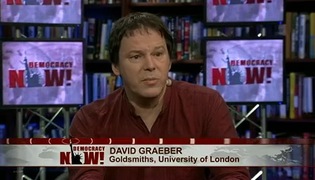
By Amy Goodman with Denis Moynihan
As many as 80,000 people marched to the Wisconsin state Capitol in Madison on Saturday as part of an ongoing protest against newly elected Republican Gov. Scott Walker’s attempt to not just badger the state’s public employee unions, but to break them. The Madison uprising follows on the heels of those in the Middle East. A sign held by one university student, an Iraq War vet, read, “I went to Iraq and came home to Egypt?” Another read, “Walker: Mubarak of the Midwest.” Likewise, a photo has circulated in Madison of a young man at a rally in Cairo, with a sign reading, “Egypt supports Wisconsin workers: One world, one pain.” Meanwhile, Libyans continue to defy a violent government crackdown against masses seeking to oust longtime dictator Moammar Gadhafi, and more than 10,000 marched Tuesday in Ohio to oppose Republican Gov. John Kasich’s attempted anti-union legislative putsch.
Just a few weeks ago, solidarity between Egyptian youth and Wisconsin police officers, or between Libyan workers and Ohio public employees, might have elicited a raised eyebrow.
The uprising in Tunisia was sparked by the suicide of a young man named Mohamed Bouazizi, a 26-year-old university graduate who could not find professional work. Selling fruits and vegetables in the market, he was repeatedly harassed by Tunisian authorities who eventually confiscated his scale. Unbearably frustrated, he set himself on fire, a spark that ignited the protests that became the wave of revolution in the Middle East and North Africa. For decades in the region, people have lived under dictatorships—many that receive U.S. military aid—suffering human-rights abuses along with low income, high unemployment and almost no freedom of speech. All this, while the elites amassed fortunes.
Similar grievances underlie the conflicts in Wisconsin and Ohio. The “Great Recession” of 2008, according to economist Dean Baker, is now in its 37th month, with no sign of relenting. In a recent paper, Baker says that, due to the financial crisis, “many political figures have argued the need to drastically reduce the generosity of public sector pensions, and possibly to default on pension obligations already incurred. Most of the pension shortfall … is attributable to the plunge in the stock market in the years 2007-2009.”
In other words, Wall Street hucksters, selling the complex mortgage-backed securities that provoked the collapse, are the ones who caused any pension shortfall. Pulitzer Prize-winning journalist David Cay Johnston said recently: “The average Wisconsin state employee gets $24,500 a year. That’s not a very big pension … 15 percent of the money going into it each year is being paid out to Wall Street to manage the money. That’s a really huge high percentage to pay out to Wall Street to manage the money.”
So, while investment bankers skim a huge percentage off pension funds, it’s the workers who are being demonized and asked to make the sacrifices. Those who caused the problem, who then got lavish bailouts and now are treated to huge salaries and bonuses, are not being held accountable. Following the money, it turns out Walker’s campaign was funded by the notorious Koch brothers, major backers of the tea party organizations. They also gave $1 million to the Republican Governors Association, which gave substantial support to Walker’s campaign. Is it surprising that Walker supports corporations with tax breaks, and has launched a massive attack on unionized, public-sector employees?
One of the unions being targeted by Walker, and by Kasich in Ohio, is AFSCME, the American Federation of State, County and Municipal Employees. The union was founded in 1932, in the midst of the Great Depression, in Madison. Its 1.6 million members are nurses, corrections officers, child-care providers, EMTs and sanitation workers. It is instructive to remember, in this Black History Month, that it was the struggle of the sanitation workers of AFSCME local No. 1733 that brought Dr. Martin Luther King Jr. to Memphis, Tenn., back in April 1968. As Jesse Jackson told me as he marched with students and their unionized teachers in Madison on Tuesday: “Dr. King’s last act on earth, marching in Memphis, Tenn., was about workers’ rights to collective bargaining and rights to dues checkoff. You cannot remove the roof for the wealthy and remove the floor for the poor.”
The workers of Egypt were instrumental in bringing down the regime there, in a remarkable coalition with Egypt’s youth. In the streets of Madison, under the Capitol dome, another demonstration of solidarity is taking place. Wisconsin’s workers have agreed to pay and pension concessions, but will not give up their right to collective bargaining. At this point, Walker would be wise to negotiate. It is not a good season to be a tyrant.
Denis Moynihan contributed to this column.
Amy Goodman is the host of “Democracy Now!,” an independent, daily global TV/radio news hour airing on more than 950 stations in the United States and around the world. She is the author of “Breaking the Sound Barrier,” recently released in paperback and now a New York Times best-seller.
© 2011 Amy Goodman












Media Options